- Home
- James Clavell
Gai-Jin
Gai-Jin Read online
PRAISE FOR JAMES CLAVELL’S GAI-JIN
The Long-Awaited Sixth Novel in His
Magnificent Asian Saga
“Gai-Jin is Shōgun plus! … Great entertainment.”
—Daily News (New York)
“Clavell keeps you turning the pages.”
—Los Angeles Daily News
“A feast of intrigue, romance, blackmail, plot and counterplot … it should be read for its ability to immerse the reader in a century and culture at once distant from our own, yet oddly familiar …. The characters’ motivations are ones that cut across time and place: corruption, greed, fear, lust, and the ancient need for revenge.”
—West Coast Review of Books
“Gai-Jin is major reading. If you like Clavell’s other novels, you’ll surely sink your teeth into this one. He is a master at capturing the Japanese persona …. He dives deep into the complexities of a monarchic society and the early attempts at cross-cultural negotiations. The result is nothing less than a saga.”
—Sun-Times (Chicago)
“Unceasingly satisfying … Clavell is in top-notch form …. He again melds plot-driven storytelling and colorful characterization in vibrant collaboration with an exotic, dynamic setting.”
—Publishers Weekly
“Exhilarating … a rich, enveloping novel.”
—Cosmopolitan
“Interesting, exciting…James Clavell fans will love it!”
—The Milwaukee Journal
“Compelling … The Japanese love fine jubako—lacquered boxes that fit within boxes that are in boxes. In Gai-Jin, James Clavell has written a jubako of a novel.”
—Christian Science Monitor
“Spirited storytelling … you get your money’s worth.”
—Kirkus Reviews
“Clavell is an artful, entertaining storyteller …. There’s not a page in Gai-Jin that doesn’t advance the plot, develop a character, or resolve some conflict with a burst of action.”
—San Jose Mercury News
“An exciting story … history, romance, exotic settings. Spies, double-dealing, narrow escapes, violent deaths. All the basic ingredients of a runaway best seller are here in James Clavell’s latest Asia-based novel, Gai-Jin.”
—The Asian Wall Street Journal Weekly
“A well-told story … few eras of Japanese history were more violent, turbulent, and politically exasperating than the 1860s…. Mr. Clavell revels in the turbulence of political death and rebirth.”
—The New York Times Book Review
JAMES CLAVELL’S ASIAN SAGA
1600 SHŌGUN
1841 TAI-PAN
1862 GAI-JIN
1945 KING RAT
1963 NOBLE HOUSE
1979 WHIRLWIND
Table of Contents
Cover
Title Page
Dedication
Map
Part One
Chapter One
Chapter Two
Chapter Three
Chapter Four
Chapter Five
Chapter Six
Chapter Seven
Chapter Eight
Chapter Nine
Chapter Ten
Chapter Eleven
Chapter Twelve
Chapter Thirteen
Chapter Fourteen
Chapter Fifteen
Chapter Sixteen
Chapter Seventeen
Part Two
Chapter Eighteen
Chapter Nineteen
Chapter Twenty
Chapter Twenty-One
Chapter Twenty-Two
Chapter Twenty-Three
Chapter Twenty-Four
Chapter Twenty-Five
Chapter Twenty-Six
Chapter Twenty-Seven
Chapter Twenty-Eight
Chapter Twenty-Nine
Chapter Thirty
Chapter Thirty-One
Part Three
Chapter Thirty-Two
Chapter Thirty-Three
Chapter Thirty-Four
Chapter Thirty-Five
Chapter Thirty-Six
Chapter Thirty-Seven
Chapter Thirty-Eight
Chapter Thirty-Nine
Chapter Forty
Chapter Forty-One
Part Four
Chapter Forty-Two
Chapter Forty-Three
Chapter Forty-Four
Chapter Forty-Five
Chapter Forty-Six
Chapter Forty-Seven
Chapter Forty-Eight
Chapter Forty-Nine
Chapter Fifty
Part Five
Chapter Fifty-One
Chapter Fifty-Two
Chapter Fifty-Three
Chapter Fifty-Four
Chapter Fifty-Five
Chapter Fifty-Six
Chapter Fifty-Seven
Chapter Fifty-Eight
Chapter Fifty-Nine
Chapter Sixty
Chapter Sixty-One
Chapter Sixty-Two
Principal Characters
About the Author
Copyright
This novel is for you, whoever you are, with deep appreciation—for without you, the writer part of me would not exist….
Gai-Jin, meaning foreigner, is set in Japan, in 1862.
It is not history but fiction. Many of the happenings did occur according to historians and to books of history which, of themselves, do not necessarily always relate what truly happened. Nor is it about any real person who lived or is supposed to have lived, nor about any real company. Kings and queens and emperors are correctly named, as are a few generals and other exalted persons. Apart from these I have played with history—the where and how and who and why and when of it—to suit my own reality and, perhaps, to tell the real history of what came to pass.
Map of Japan in 1862
One
CHAPTER ONE
YOKOHAMA
14TH SEPTEMBER 1862:
The panic-stricken girl was galloping full speed back towards the coast, half a mile ahead, along footpaths that led precariously through the rice swamps and paddy fields. The afternoon sun bore down. She rode sidesaddle and though normally expert, today she could hardly keep her balance. Her hat had vanished and her green riding habit, the height of Parisian fashion, was ripped by brambles and speckled with blood, tawny fair hair streaming in the wind.
She whipped the pony faster. Now she could see the tiny hovels of the Yokohama fishing village clustering the high fence and canals that enclosed the Foreign Settlement and spires of the two small churches within and knew, thankfully, in the bay beyond were British, French, American and Russian merchantmen and a dozen warships, both steam and sail.
Faster. Over narrow wooden bridges and canals and irrigation ditches that crisscrossed the paddy and swamps. Her pony was lathered with sweat, a deep wound on his shoulder and tiring rapidly. He shied. A bad moment but she recovered, and now she swerved onto the path that led through the village to the bridge over the encircling canal and to the main gate and the samurai guard house, and Japanese Customs House.
The two-sworded samurai sentries saw her coming and moved to intercept, but she charged through them into the wide main street of the Settlement proper on the seafront. One of the samurai guards rushed for an officer.
She reined in, panting. “Au secours … à l’aide, help!”
The promenade was almost deserted, most of the inhabitants at siesta or yawning in their countinghouses, or dallying in the Pleasure Houses outside the fence.
“Help!” she called out again and again, and the few men spread along its length, British traders and off-duty soldiers and sailors mostly, some Chinese servants, looked up startled.
“God Almighty, look there! It’s the Fr
ench girl …”
“What’s amiss? Christ, look at her clothes …”
“Cor, it’s her, the smasher, Angel Tits, arrived couple of weeks ago …”
“That’s right, Angelique … Angelique Beecho or Reecho, some Frog name like that…. ”
“My God, look at the blood!”
Everyone began converging on her, except the Chinese who, wise after millennia of sudden trouble, vanished. Faces began to appear in windows.
“Charlie, fetch Sir William on the double!”
“Christ Almighty, look at her pony, poor bugger will bleed to death, get the vet,” a corpulent trader called out. “And you, soldier, quick, get the General, and the Frog, she’s his ward—oh, for God’s sake, the French Minister, hurry!” Impatiently he pointed at a single-story house flying the French flag. “Hurry!” he bellowed. The soldier rushed off, and he trundled for her as fast as he could. Like all traders he wore a top hat and woolen frock coat, tight pants, boots, and sweated in the sun. “What on earth happened, Miss Angelique?” he said, grabbing her bridle, aghast at the dirt and blood that speckled her face and clothes and hair. “Are you hurt?”
“Moi, non … no, I think not but we were attacked…Japanners attacked us.” She was trying to catch her breath and stop shaking, still in terror, and pushed the hair out of her face. Urgently she pointed inland westwards, Mount Fuji vaguely on the horizon. “Back there, quick, they need—need help!”
Those nearby were appalled and noisily began relaying the half news to others and asking questions: Who? Who was attacked? Are they French or British? Attacked? Where? Two-sword bastards again! Where the hell did this happen … ?
Questions overlaid other questions and gave her no time to answer, nor could she yet, coherently, her chest heaving, everyone pressing closer, crowding her. More and more men poured into the street putting on coats and hats, many already armed with pistols and muskets, a few with the latest American breech-loading rifles. One of these men, a big-shouldered, bearded Scot, ran down the steps of an imposing two-story building. Over the portal was “Struan and Company.” He shoved his way through to her in the uproar.
“Quiet, for God’s sake!” he shouted, and in the sudden lull, “Quick, tell us what happened. Where’s young Mr. Struan?”
“Oh, Jamie, je … I—I …” The girl made a desperate effort to collect herself, disoriented. “Oh, mon Dieu!”
He reached up and patted her shoulder like a child, to gentle her, adoring her, like all of them. “Don’t worry, you’re safe now, Miss Angelique. Take your time. Give her some room, for God’s sake!” Jamie McFay was thirty-nine, chief manager of Struan’s in Japan. “Now, tell us what happened.”
She brushed away the tears, her tawny hair askew. “We…we were attacked—attacked by samurai,” she said, her voice tiny and accent pleasing. Everyone craned to hear better. “We were…we were on the … on the big road …” Again she pointed inland. “It was there.”
“The Tokaidō?”
“Yes, that’s it, the Tokaidō …” This great coastal trunk toll road, a little over a mile west of the Settlement, joined the Shōgun’s forbidden capital, Yedo, twenty miles northwards, to the rest of Japan, also forbidden to all foreigners. “We were … riding ….” She stopped and then the words poured out: “Mr. Canterbury, and Phillip Tyrer and Malcolm—Mr. Struan—and me, we were riding along the road and then there were some … a long line of samurai with banners and we wait to let them pass then we … then two of them rush us, they wound Mr. Canterbury, charge Malcolm—Mr. Struan—who had his pistol out and Phillip who shout me to run away, to get help.” The shaking began again. “Quick, they need help!”
Already men were rushing for mounts, and more guns. Angry shouts began: “Someone get the troops …”
“Samurai got John Canterbury, Struan, and that young chap Tyrer—they’ve been chopped on the Tokaidō.”
“Christ, she says samurai have killed some of our lads!”
“Where did this happen?” Jamie McFay called out above the noise, curbing his frantic impatience. “Can you describe the place where this happened, exactly where?”
“By the roadside, before Kana … Kana something.”
“Kanagawa?” he asked, naming a small way station and fishing village on the Tokaidō, a mile across the bay, three odd miles by coastal road.
“Oui—yes. Kanagawa! Hurry!”
Horses were being led out of the Struan stables, saddled and ready. Jamie slung a rifle over his shoulder. “Don’t worry, we’ll find them quickly. But Mr. Struan? Did you see if he got away—if he was hurt?”
“Non. I saw nothing, just the beginning, poor Mr. Canterbury, he … I was riding beside him when they …” The tears flooded. “I did not look back, I obeyed without … and came to get help.”
Her name was Angelique Richaud. She was just eighteen. This was the first time she had been outside the fence.
McFay jumped into the saddle and whirled away. Christ Almighty, he thought in anguish, we haven’t had any trouble for a year or more, otherwise I’d never have let them go. I’m responsible; Malcolm’s heir apparent and I’m responsible! In the Name of God, what the hell happened?
Without delay, McFay, a dozen or so traders, and a Dragoon officer with three of his lancers found John Canterbury on the side of the Tokaidō, but viewing him was more difficult. He was decapitated and parts of his limbs were scattered nearby. Ferocious sword cuts were patterned all over his body, almost any one of which would have been a death blow. There was no sign of Tyrer and Struan, or the column of samurai. None of the passersby knew anything about the murder, who had done it, or when or why.
“Would the other two have been kidnapped, Jamie?” an American asked queasily.
“I don’t know, Dmitri.” McFay tried to get his brain working. “Someone better go back and tell Sir William and get … and bring a shroud or coffin.” White-faced, he studied the passing crowds, who carefully did not look in his direction but observed everything.
The well-kept, beaten earth roadway was massed with disciplined streams of travellers to and from Yedo, which one day would be called Tokyo. Men, women and children of all ages, rich and poor, all Japanese but for an occasional long-gowned Chinese. Predominately men, all wearing kimonos of various styles and modesty, and many different hats of cloth and straw. Merchants, half-naked porters, orange-robed Buddhist priests, farmers going to or coming from market, itinerant soothsayers, scribes, teachers and poets. Many litters and palanquins of all kinds for people or goods with two, four, six or eight bearers. The few strutting samurai amongst the crowds stared at them balefully as they passed.
“They know who did it, all of them,” McFay said.
“Sure. Matyeryebitz!” Dmitri Syborodin, the American, a heavyset, brown-haired man of thirty-eight, roughly clothed and a friend of Canterbury, was seething. “It’d be goddam easy to force one of them.” Then they noticed a dozen or so samurai standing in a group down the road, watching them. Many had bows and all Westerners knew what adept archers samurai were.
“Not so easy, Dmitri,” McFay said.
Pallidar, the young Dragoon officer, said crisply, “Very easy to deal with them, Mr. McFay, but ill-advised without permission—unless of course they attack us. You’re quite safe.” Settry Pallidar detailed a dragoon to fetch a detachment from the camp, with a coffin, the American visibly irritated by his imperiousness. “You’d better search the nearby countryside. When my men arrive they’ll assist. More than likely the other two are wounded somewhere.”
McFay shuddered, motioned at the corpse. “Or like him?”
“Possibly, but let’s hope for the best. You three take that side, the rest of you spread out and—”
“Hey, Jamie,” Dmitri interrupted deliberately, hating officers and uniforms and soldiers, particularly British ones. “How about you and me going on to Kanagawa—maybe someone in our Legation knows something.”
Pallidar disregarded the hostility, understanding it,
well acquainted with the American’s fine service record. Dmitri was an American of Cossack extraction, an ex-cavalry officer of the U.S. Army, whose grandfather had been killed fighting the British in the American War of 1812. “Kanagawa is a good idea, Mr. McFay,” he said. “They should certainly know what big procession of samurai passed through and the sooner we find out who the culprit is the better. The attack must have been ordered by one of their kings or princes. This time we can peg the bastard and God help him.”
“God rot all bastards,” Dmitri said pointedly.
Again the resplendently uniformed Captain did not provoke but did not let it pass. “Quite right, Mr. Syborodin,” he said easily. “And any man who calls me a bastard better quickly get himself a second, a pistol or sword, a shroud and someone to bury him. Mr. McFay, you’ll have plenty of time before sunset. I’ll stay here until my men return, then we’ll join the search. If you hear anything in Kanagawa, please send me word.” He was twenty-four and worshipped his regiment. With barely concealed disdain he looked at the motley group of traders. “I suggest the rest of you … gentlemen … begin the search, spread out but stay in visual contact. Brown, you go with that group and search those woods. Sergeant, you’re in charge.”
“Yessir. Come on, you lot.”
McFay took off his coat and spread it over the body, then remounted. With his American friend he hurried northwards toward Kanagawa, a mile away.
Now the dragoon was alone. Coldly he sat on his horse near the corpse and watched the samurai. They stared back. One moved his bow, perhaps a threat, perhaps not. Pallidar remained motionless, his sabre loose in its scabbard. Sunlight sparked off his gold braid. Pedestrians on the Tokaidō hurried by silently, afraid. His horse pawed the ground nervously, jingling the harness.
This isn’t like the other attacks, the lone attacks, he thought with growing anger. There’s going to be hell to pay, attacking those four, a woman amongst them, and killing an Englishman so foully. This means war.

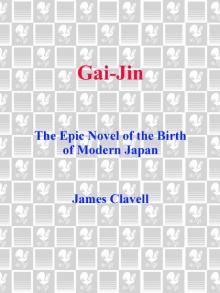 Gai-Jin
Gai-Jin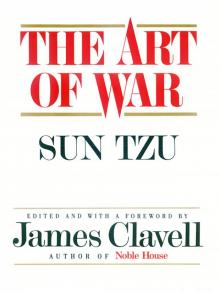 The Art of War
The Art of War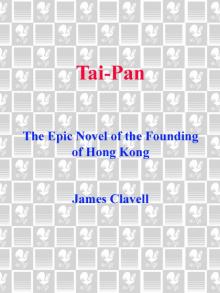 Tai-Pan
Tai-Pan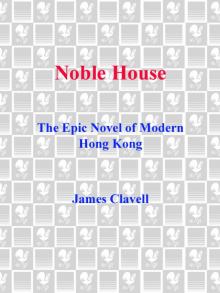 Noble House
Noble House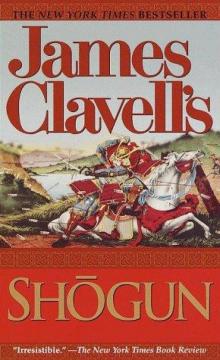 Shōgun
Shōgun Whirlwind
Whirlwind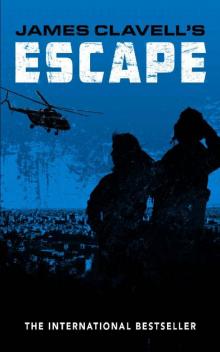 Escape
Escape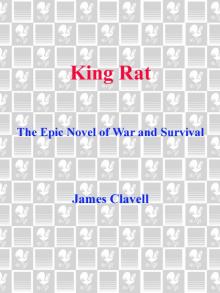 King Rat
King Rat The Children's Story
The Children's Story